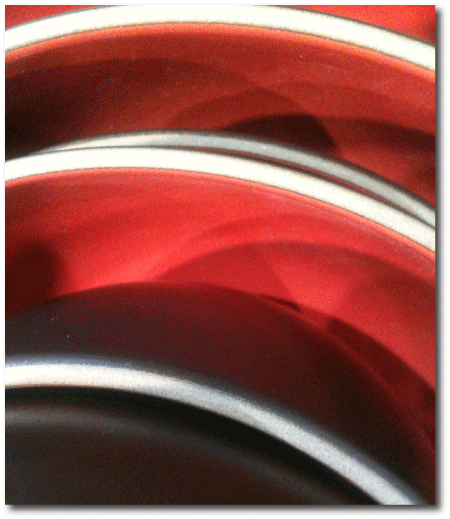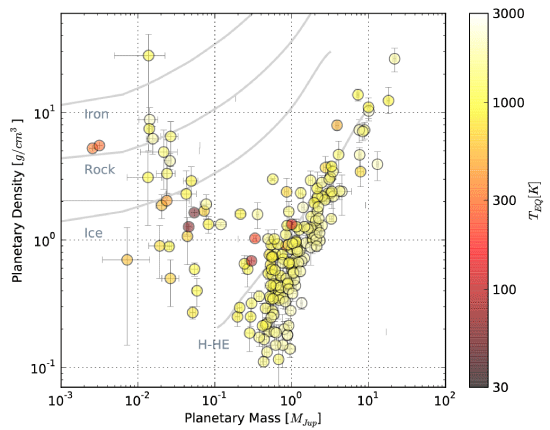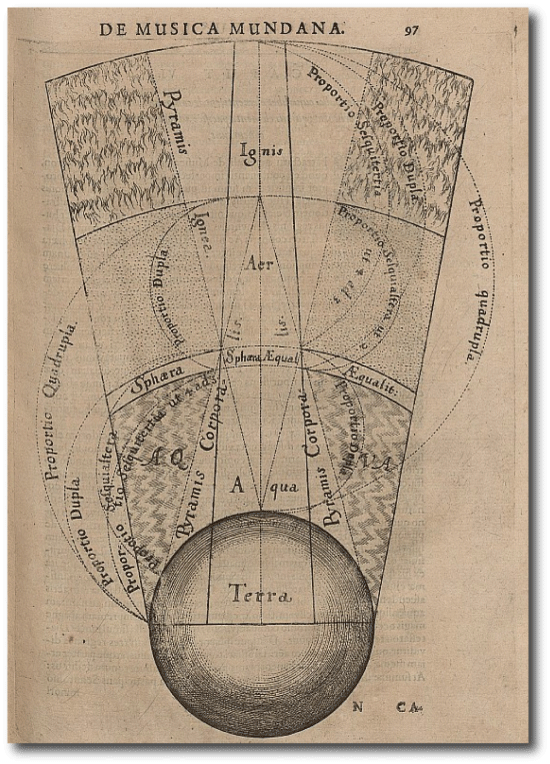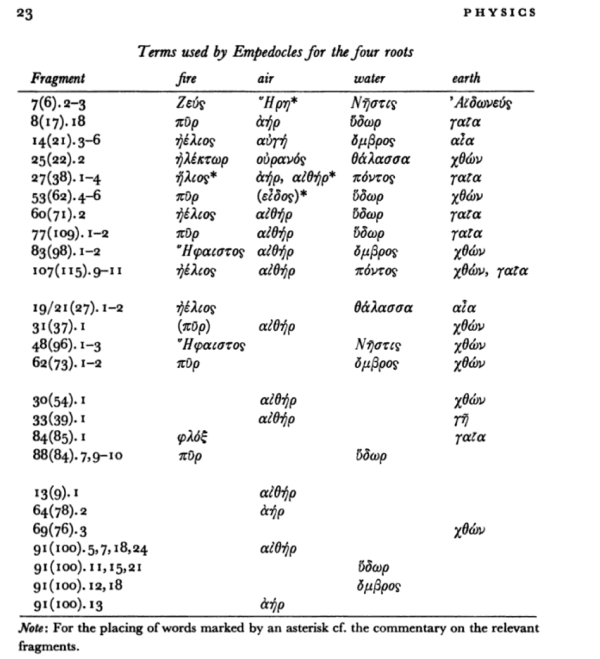I think it’s worth making an attempt to coin a term for these “ungiant” planets that are, effectively by default, largely being referred to as super-Earths, a term which brings to mind Voltaire’s remark regarding the Holy Roman Empire.
Planets in the category:
1. Have masses between ~1% and ~10% of Jupiter’s mass.
2. Have unknown composition, even if their density is known.
Ideally, a term for such planets would:
3. Have a satisfying etymology springing from the ancient Greek.
4. Not be pretentious, or, much more critically, not be seen as being pretentious.
Simultaneously satisfying conditions 3 and 4 is certainly not easy, and indeed, may not be possible. (See, e.g., http://arxiv.org/abs/0910.3989)
I’ve noticed that the esoteric efforts to describe the interiors of these planets — in the absence of any data beyond bulk density — effectively boil down to Robert Fludd’s 1617 macrocosm of the four classical elemental spheres:
This led me to look into Empedocles’ four elements themselves, see, e.g., here. Specifically, can a term of art for the planets of interest be constructed from the original Greek roots?
The following table on p. 23 of Wright, M. R., Empedocles: The Extant Fragments, Yale University Press, 1981, contains various, possibly appropriate, possibilities:
To get going, I had to refer to the rules for romanization of Greek. Initial attempts to coin names (while abundantly satisfying requirement #3 above) have so far failed miserably on requirement #4: chonthalaethian planets, ambroaethic planets, gaiapontic planets. Yikes!
The Tetrasomia, or Doctrine of the Four Elements, alludes to the secure fact that these planets are unknown compounds of metal, rock, ices, and gas. Tetrian planets, maybe? Suggestions welcome…





I actually like chonthalaethian, though I might standardize it to something like conthalethian (and it really does sound like you’re lisping at “constellation” when you try to say it).
The most obvious Greek root would be to call them “macroplanets” or “megaloplanets” though it would not seem to be a scheme that extends well (what are “giant” planets? what are “microplanets”?)
It’s not Greek but “Brobdingnagian” might be appropriate (since Brobdingnag is a LAND, it’s inappropriate for gas giants).
Behemoth has ancient origin (Hebrew), and is especially evocative for waterworlds.
On the biblical theme, one might look to the wine bottles for synonyms of “large”, but that might be too obscure or pretentious: http://en.wikipedia.org/wiki/Wine_bottle
One thing these planets will all have in common is large surface areas compared to Earth, but synonyms to “vast” and “immense” don’t lend to good modifiers for “planets”.
I wonder if we should look to fiction? Are there any legendary or fictional lands that are vastly larger than ours? The only one that comes to mind is Ringworld, which doesn’t help…
Well given the mixture of sub-Neptunes, ocean planets and terrestrials expected to be in this range, how about Poseidon planets? Poseidon was the Greek god of the sea (nicely covering the ocean planets), also the god of earthquakes (which ties him to the terrestrials) and of course the Greek equivalent of Neptune (got the sub-Neptunes). Benefits from alliteration but the pretentiousness requirement may be a problem…
That’s an appealing idea, and pairs nicely with Kevin Zahnle’s scheme for categorizing Earth impactors:
Xavier Bonfils writes:
I really like Xavier’s suggestion! “eurydicean planets” — reminiscent of the de Medician planets. I think it fits the bill for your class of planets quite well.
The name is also used for minor planet 75 (Eurydike), but the spelling difference is probably sufficient to distinguish them.
What about a draw from Norse mythology?
Going back to the Poseidon/Neptune theme… Njord is the norse god of the sea and he married Skadi, the giantess from the mountains. So the planets could be called the “Skadian planets”.
The Vanir were gods of fertility, and these would be planets that would possibly have water and thus life, so perhaps Freya, the Vanir goddess of fertility (aka the top goddess of the bunch who are known for that) could be used… “Freyan planets”, maybe? “Vanirian planets” could also work, but it sounds more like an STD than anything else lol.
Odin is the main god, god of creation, so they could be the “Odinian planets” I suppose.
Jord was goddess of Earth, which implies a step above/bigger than Earth, which these planets would be (bigger than earth). “Jordian planets” sounds nice.
Just some for consideration.
I honestly like the names for the planetary categories. However, being human, we compartmentalise objects and as Astrophysicists I suppose we are no different. However, nature tends to throw a spanner in the works, revisions follow and a new theory results. Before the cycle repeats once again…